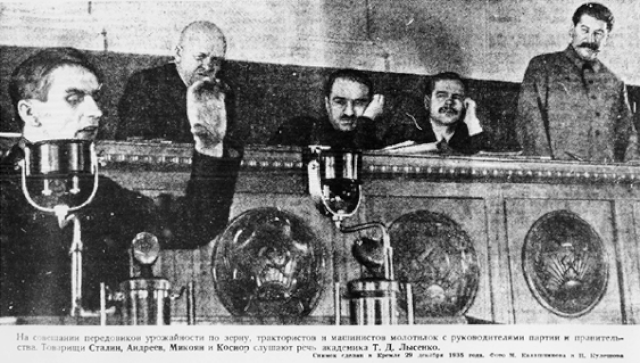“Nature versus nurture“?
Controversies about heredity pit classical gene-theory against environmental-developmental theories. The former invokes an unchanging gene and is associated with Mendel, Weismann, Watson and Crick – and later with Dawkins. Environmentalists see heredity as malleable to the ‘outside’ world, and are linked to Lamarck, Lysenko and the modern Epigenetic school – and the Marxist Lewontin. This controversy continues to be intrinsically and intensely political. This article has three aims: To synopsise Engels on ever-changing nature; to outline briefly modern epigenetic (developmental) knowledge against classical genetics and Lysenkoism; and to consider the political rise of Lysenko. This complex area is more fully detailed here: Marxism and Science January 2022.
Engels on Nature and Dialectics
Marx and Engels disparaged ‘mechanical materialism’, or ‘reductionism’. They conceptualized an ever-changing world. As Marx delved into society, Engels systematized their joint views on philosophy and nature.
Engels argued that two principles imbued nature — universal change (coupling transformation and negations); and ‘holism’ (an interpenetration of opposites). These underly a universe where ‘laws’ play out. Change was a fundamental principle in nature:
“The whole of nature, from the smallest element to the greatest, from grains of sand to suns, from protista to men, has its existence in eternal coming into being and passing away, in ceaseless flux, in unresting motion and change.” (Engels 1987)
Just as was it in society, which Marx described as ‘an organism’:
“present society is no solid crystal, but an organism capable of change, constantly changing.” (Marx 1976)
Engels’ second principle opposed rigid ‘hard and fast lines’, by applying laws of ‘interpenetration of opposites’, and ‘negation of the negation’:
“Dialectics.. prevails throughout nature … Hard and fast lines are incompatible with… evolution. Even the borderline between vertebrates and invertebrates is no longer rigid… Dialectics knows no HARD AND FAST LINES, no unconditional, universally valid “either”- “or”.”
Opposed to foisting theories onto nature, Engels insisted:
“As in historical science, one must proceed from given facts, in natural science the interconnections are not to be built into the facts but discovered in them, and… verified as far as possible by experiment.”
This parallels Marx’s view of society:
“By studying each of these evolutions on its own, and then comparing them, one will easily discover the key to the phenomenon, but it will never be arrived at by the all-purpose formulae of a general theory.” (Marx 1989)
Unsurprisingly, Engels could not specify specific genetic theory as basic grounding discoveries were still awaited. But his startling insights of change and interpenetration of opposites were borne out later, in genetics.
Early theories of genetics
By the 1800s heredity was seen as a blending of characteristics from two parents. Already ‘preformationists’ argued for a prefigured outcome; against ‘epigeneticists’ who pointed to development. In 1802 Lamarck presented his theory where evolution incorporated ‘inheritance of acquired characteristics‘.
This envisaged animals responding to changed environments, with new habits and bodily functions, which passed on to progeny (e.g. the giraffe’s long neck). But Lamarck offered only a “brilliant anticipation”, said Engels, because scientific details were still insufficient.
Gradually, largely influenced by mechanical materialist developments in other sciences (eg physics), a ‘particulate‘ theory of hereditary prevailed over ‘blending’. Darwin hypothesised in 1875 a ‘gemmule’. Meanwhile Mendel reported ‘discrete units’ or ‘factors’, later to be called ‘genes’. In pea experiments, he found the segregation (separation) of characteristics.
Contemporaneously, Weismann removed tails in mice, whose offspring had normal tails. For Weismann, these simple experiments proved Lamarck wrong. He now invoked ‘protection’ for ‘germ cells’ (sperm or eggs), locating heredity in/on newly discovered chromosomes in the nucleus. Weismann’s dictum became hereditary information goes from the nucleus to cytoplasm, never in reverse. Germ cells remained ‘unchanged’ over generations (Keller 2000). Sutton extended this, saying chromosomes formed the “physical bases of the Mendelian law of heredity.” (Sapp)
Chromosomes were conceptualised as mappable chains of genes. When Morgan caused visible chromosome mutations in the fruit fly, he associated them to phenotypic (i.e. externally seen features) changes. Yet his Nobel Lecture acknowledged:
“There is no consensus of opinion amongst geneticists as to what the genes are, whether they are real or purely fictitious […] it does not make the slightest difference.” (Morgan 1934).
Fictitious or not, gene theory became ever more determinist and mechanistic. Geneticists spoke of ‘‘a gene for this and a gene for that,” as they still do. Some countered this position: C.H. Waddington (England) and I. I. Schmalhausen (USSR), aimed to integrate environmental pressures and genome. They balanced continuity-stability forces (nucleus) with disruption-adaptation forces (cytoplasm). They argued that natural selection (proposed by Darwin) not only gave a direction (new adaptations to new circumstances) but it also stabilized the genome. Hence if a well adapted characteristic , took on random variation in that characteristic, this only reduced ‘fitness’ to the environment. Natural selection prevented disturbances, because physiology was canalized, becoming ‘insensitive’. (Lewontin and Levins 2000)
Many such voices against a purely ‘nuclear monopoly’ were ignored (Sapp). Ironically, an English Marxist, J.B.S. Haldane helped the rout of environmentalists, mathematically underpinning a ‘Modern Synthesis’ of gene and evolutionary theories. Genes were proclaimed the motor of evolution, driven by random nuclear-gene-chromosomal mutation. This relied on ‘blind chance’ leaving natural selection to funnel ‘superior fits’. Till recently even Marxists in modern biology agreed, including Lewontin:
“The organism […] bears a significant mark of random processes.” (Lewontin 2000).
After Watson and Crick famously discovered DNA (1953), this was hailed as the ‘Master Molecule’ (Keller 2000). The Weismann one-way traffic (nucleus to cytoplasm) now became Crick’s ‘Central Dogma’:
“Transfer [of information] from protein to protein, or from protein to nucleic acid is impossible” (Crick 1970).
Lysenko’s views
In contrast to gene-centric views, Lysenko held that heredity was a life-long physiological interaction between organism and environment, the gene was not immutable nor eternal:
“The principal error the geneticists commit is their contention that genes are immutable in a long line of generations.” (Lysenko 1936; Soyfer 1994).
Lysenko rejected the Morganist concept of chromosomes, saying heredity included environment:
“Heredity is […] the property of a living body to require definite conditions for its life and development and to respond in a definite way to various conditions.” (Lysenko 1943)
Lysenko believed that heredity (especially in plants) could be moulded in a ‘definite direction’. It followed that Lysenko rejected Weismann:
“The materialistic theory of the evolution of living nature necessarily presupposes the recognition of heredity transmission of individual characteristics acquired by the organism under definite conditions of its life, it is unthinkable without recognition of the inheritance of acquired characteristics.” (Lysenko 1948)
Hence a ‘sharp controversy’ divided biologists: Can characters and properties acquired by plant and animal organisms in the course of their life be inherited?
Lysenko claimed he utilised dialectics, and criticised Darwin, who he said:
“Based on Malthus’ theory of overpopulation… inferred a struggle presumably going on within species” (Lysenko 1948)
Actually Marx and Engels previously criticised Darwin for importing into nature societal views from Hobbes and Malthus. Most Marxists accept this and extend it to current ‘sociobiology’ (Rose, 1984; Lewontin 2000).
Modern Epigenetics in relation to Lysenko’s theories
But Lysenko’s claims took form as a theoretical mechanical reductionism. Lysenko’s data lacked statistical and experimental rigour. However, modern data confirms Lysenko’s theory in parts. Especially on vegetative propagation (asexual plant breeding including grafting). Inheritance by acquired characteristics clearly does occur.
-
Mechanisms to conserve life accumulated changes are described. These may arise from both environmentally directed adaptations or from genetic mutations.
-
Nuclear genes or DNA are modifiable by environment through life.
-
Nucleus and cytoplasm share responses of cell and organism.
However, against Lysenko, who argued genes did not exist:
- It is the DNA molecule and genes, interacting with ‘regulators’ that form the mechanism by which environment affects heredity. i.e. the gene does exist.
- Thus graft hybridisation occurs, but by mechanism called Horizontal Gene Transfer.
Lysenko came to control agriculture in the USSR for a period, but was unable to improve outputs in the USSR. However while grain production was not improved, it was not reduced (Levins and Lewontin 1985).
In summary, Lysenko dogmatically pronounced on weak evidence. However, key portions of Lysenkoism turns out by modern theory to be correct, and challenges Western classical genetic dogmas. The principle of change and inter-connectedness in the world are fundamental. Translated – both gene and environment – explain heredity.
Thus both Western orthodox genetics, and Lysenkoism were wrong in insisting on exclusive merits. Only a two-sided approach (a molecular toolbox of DNA, and environmental signalling) forms a coherent theory. Doubtless that while Lysenko was partly correct his ‘Arakcheyevism’ (authoritarianism, dogmatism, bullying) rendered USSR agronomy paralysed.
Lysenko’s capture of agricultural control in USSR
What explains Lysenko’s rise to power? By 1945, after the Second World War, the USSR had lost 20 million people or a tenth of the population (McCagg 1978); lost a massive infrastructure and was encircled (Levins and Lewontin 1985). Cold War politics portrayed Lysenko and Morgan as political representatives of either ‘communism; or ‘capitalism’:
“Lysenko portrayed Mendelian genetics as an ‘American’, ‘imperialist’, ’racist’, and ‘fascist’ pseudoscience, the Western media presented ‘Lysenkoism’ as a ‘Soviet’, ‘Communist’, ‘Marxist’, ‘totalitarian’ pseudo-science” (Dejong-Lambert 2012).
The purges cut through Soviet life, but Joravsky differs as to its effects on Lysenkoism:
“It is widely believed that the Lysenkoites had a direct line to the apparatus of terror and deliberately used it to get rid of their opponents… though the evidence offered has been extremely weak” (Joravsky 1986).
Conventional wisdom is that Stalin was responsible for the purges and for Lysenko’s rise. Here I only discuss the latter. Stalin probably agreed with aspects of Lysenkoism, such as inheritance of acquired characteristics. Roll-Hansen commented in 2015:
“Looking back… one can perhaps add that there was a grain of truth in Stalin’s judgment.”
Actually early on Stalin’s support for Lysenko was ‘weak’ says the main historian of the Lysenko Affair – Joravsky:
“as he was pushing his way to the top… Stalin’s public endorsement was comparatively weak… At a farmers’ meeting in 1935, when Lysenko stumbled in his speech and apologized for being a vernalizer (A treatment of seeds with cold supposedly to spur cold-hardiness -HK) rather than an orator, Stalin interjected “Bravo, Comrade Lysenko!” (Joravsky 1986)
But Jorasvky goes on to say:
“The highest chief, Stalin, was subtly evasive, though pro-Lysenkoite. On May 17, 1938… he proposed a toast…: “To the flourishing of science … whose people … do not want to be slaves of tradition…” Stalin refrained from a forthright statement that would have ended all disagreement and mobilized all officialdom in support of agrobiology. As a result, the chiefs of higher learning and ideology kept on fumbling for a compromise.”
It is evident that the reality was more complicated than usually depicted. Stalin was increasingly in a minority of Marxist-Leninists (McCagg 1978). Two factions within the party – Andrey Zhdanov’s and Malenkov’s – struggled against each other. Yuri Zhdanov, was enticed into an open attack on Lysenko, who had been intimidating classical geneticists.
This enabled Malenkov to counter-attack and stage the 1948 session on biology. Here Lysenko’s address summarised two ‘trends in Soviet biology’. Stalin had been asked to edit Lysenko’s speech. Stalin removed statements such as:
“Any science is class-oriented by nature” (Stalin wrote in his edit: “Ha-Ha-Ha!! And what about Mathematics? And Darwinism?”); and: “By its nature the modern capitalist system cannot tolerate a true depiction of natural development”, and “there is no genuine science in that bourgeois society” (Pollock E, 2008).
Conference participants demanded to know if Lysenko’s line against any notion of the gene, was endorsed by the party. Malenkov’s team ensured Lysenko could reply that the Central Committee endorsed Lysenko. This effectively stopped opposition. Under Lysenko’s domination, wide spread firing of university teachers, academicians and researchers – known as anti-Lysenkoist – ensued. This had a dire impact on USSR science.
Conclusions
Engels viewed nature as an interconnected, perpetual change. Neither Morgan and Lysenko found a realistic mechanism to explain this in genetics. Both were reductionist, obstructing understanding of reality in nature. Battles in genetic theory based upon political ideology occurred in both the West and the USSR. Epigenetics is the ‘proof of the pudding’ of dialectics in genetics. Currently heredity and theories of evolution are being rethought. Complicating purely biological reductionism, is political reductionism that insists upon painting Stalin as the all-evil solitary dictator of all that happened. Such political reductionism masks the real history of the battles of factions of revisionist politicians inside the USSR and obstruct any real history of Lysenkoism.
References
Crick, Francis. 1970. Central Dogma of Molecular Biology. Nature 227(5258): 561–563.
Dejong-Lambert, Krementsov WN. 2012. J History of Biology 45: 373–388.
Engels, Frederick.1987. Dialectics of Nature. CW, Vol. 25.
Joravsky, David. 1986. The Lysenko Affair.
Keller, Evelyn F. 2000. The Century of the Gene.
Levins, Richard and Lewontin, R. 1985. The Dialectical Biologist.
Lewontin, Richard. 2000. The Triple Helix: Gene Organism and Environment.
Lewontin, Richard and Levins R. 2000. Schmalhausen’s Law. Capitalism, Nature and Science 11(4): 103–108
Lysenko, Trofim D. 1954. In Agrobiology: Essays on Problems of Genetics, Plant Breeding and Seed Growing; 1936; 1943.
Marx, Karl. 1976. ‘The Poverty of Philosophy’ 1847.” CW, Vol. 6; 1989. “Letter to Editor (Saltykov-Schedrin) regarding Marx’s Critic N.K. Mihailovsky.” CW, Vol. 24.
McCagg, William O., Jr. 1978. Stalin Embattled 1943–1948.
Pollock, Ethan; 2008. Stalin And The Soviet Science Wars
Roll-Hansen, Nils. 1985.; Annals of Science 42(3): 261–278; and, 2015. Studies East European Thought 67: 91–109.
Rose, Steven, Leon J. Kamin and R.C. Lewontin. 1984. Not in Our Genes;
Sapp, Jan. 1987. Beyond the Gene. Cytoplasmic Inheritance and the Struggle for Authority in Genetics; and 2009, Molecular Reproduction and Development 76: 903–911.
Soyfer, Valery N. 1994. Lysenko and the Tragedy of Soviet Science.



